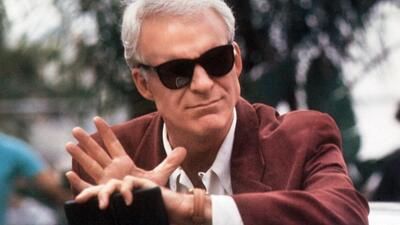That assessment is unfair, of course, but it does help explain why some of Martin’s greatest triumphs—including “Roxanne” and “L.A. Story”—seem to flow directly from his personal maturation and increasingly sophisticated sensibility. Directed, respectively, by Fred Schepisi and Mick Jackson, those two films cemented the idea of what kind of movie star Martin was: witty, charming, romantic, urbane, bright, a touch melancholic. Martin wrote both scripts—“Roxanne” was a modern redo of “Cyrano de Bergerac”—and in the process gave viewers a new way of seeing him.
But even when he hasn’t written his own material, there’s often a thematic coherence to the work. Watch how “Roxanne” and “L.A. Story” stem from his essence—and then compare them to the equally great “Planes, Trains and Automobiles,” which was directed, written by and produced by John Hughes. The difference in his crisp, astute comedic presence is negligible. Then recall his slimy faith healer in “Leap of Faith,” the haughty stranger in “The Spanish Prisoner,” even the soulless football team owner of “Billy Lynn’s Long Halftime Walk”: The roles are lit up by Martin’s intelligence, by that agile mind that wants to try something different, simply because he’s never done it before. Even his broad, mostly mediocre, family comedies—“Father of the Bride,” “Cheaper by the Dozen,” “The Pink Panther”—are redeemed by the slightly detached air he brings to them. Martin’s never above the material—although, you could argue, he really should have been in the case of, say, “Sgt. Bilko”—but there’s always a look in his eyes that suggests that these roles, like his stand-up persona decades before, are something of a false front. They’re not the real Steve Martin, which makes us curious who the real Steve Martin is.
That not-knowing has been part of his appeal for a long time, and it’s something “Steve! (Martin)” tries to address, to limited success. Neville asks friends and colleagues about Martin, and they seem at a bit of a loss: They confess that there’s something unknowable about the guy. Is he all masks? An artist who’s intensely private and not especially forthcoming—even Born Standing Up is more about his stand-up journey than it is about him—Martin has fashioned a career out of perfecting a facsimile of himself that we all love. And yet we can’t help but want to peek behind the curtain.

